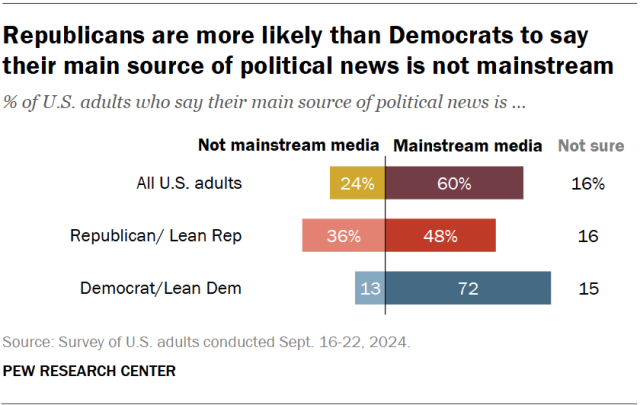☀️ Happy Thursday! The Briefing is your guide to the world of news and information. Sign up here!
In today’s email:
- Featured story: Newspaper non-endorsements draw reader backlash
- New from Pew Research Center: Americans’ top sources of political news ahead of the 2024 election
- In other news: Meta announces deal with Reuters to use outlet’s reporting in AI chatbot
- Looking ahead: Do Americans think the result of the election will be clear after votes are counted?
- Chart of the week: Republicans more likely than Democrats to say their main source of political news is not mainstream
🔥 Featured story
As Election Day approaches, several major news organizations, including The Washington Post, Los Angeles Times and USA Today, have announced that they will not endorse a candidate in the presidential race. These decisions have resulted in backlash from some readers: For example, about 10% of the Post’s subscribers – totaling at least 250,000 – canceled their subscriptions.
Most Americans believe that U.S. news organizations are at least somewhat influenced by corporations and financial interests (84%) or by the government and political interests (83%), according to a 2024 Pew Research Center survey. This includes about half who say news organizations are influenced a great deal by financial interests (51%) or political interests (49%).
🚨 New from Pew Research Center
We recently asked Americans, in an open-ended question, to name their main source of political news. We got hundreds of unique answers across more than 8,000 responses.
The most common single outlet that Americans name as their main source for political news is Fox News (13%), with CNN a close second at 10%.
Our larger study on how Americans are getting election news ahead of Election Day also asked about Americans’ sources of political news in other ways.
📌 In other news
- Meta strikes deal with Reuters to use its news content in AI chatbot
- Washington Post analysis finds Republicans experience higher levels of engagement than Democrats on X
- Baltimore Sun cuts features section, leaving it without culture coverage for the first time since 1888
- CNN bars conservative commentator after offensive on-air remarks to guest Medhi Hasan
- Andrea Mitchell to end her MSNBC show after 16 years
- TikTok users in Mexico use code words to report on cartel violence
📅 Looking ahead
After the polls close and votes are being counted next week, Americans will be faced with an uncertain news and information environment. In 2020, there was controversy over when states were called on election night, and news outlets did not project the final Electoral College result until several days later. Donald Trump then spent months contesting the result.
A Center survey conducted a few weeks ago asked Americans how confident they are that after all the votes are counted, it will be clear who won the election. While a large majority of Kamala Harris supporters (85%) are very or somewhat confident this will be the case, a smaller majority of Trump supporters (58%) express this view, including just 19% who are very confident. Harris supporters also are more confident than Trump supporters in how well the election will be administered.
📊 Chart of the week
This week’s chart comes from a recent Center survey that asked Americans to name their main source of political news. Among those who listed a main source of political news, six-in-ten say that their source is part of the mainstream media.
Democrats and independents who lean toward the Democratic Party are more likely than Republicans and GOP leaners to say that their main source of political news is part of the mainstream media, while Republicans are more likely to say their main source is not mainstream.

👋 That’s all for this week.
The Briefing is compiled by Pew Research Center staff, including Naomi Forman-Katz, Jacob Liedke, Sarah Naseer, Christopher St. Aubin, Luxuan Wang and Emily Tomasik. It is edited by Michael Lipka and copy edited by David Kent.
Do you like this newsletter? Email us at journalism@pewresearch.org or fill out this two-question survey to tell us what you think.